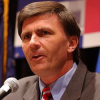Bob Ehrlich

Bob Ehrlich
Robert Leroy "Bob" Ehrlich, Jr.is an American attorney and Republican politician who served as the 60th governor of Maryland from 2003 to 2007 after defeating Democratic opponent Kathleen Kennedy Townsend in the 2002 election. Prior to serving as governor, Ehrlich represented Maryland's 2nd Congressional district in the U.S. House of Representatives. Before that he served in the Maryland House of Delegates...
NationalityAmerican
ProfessionPolitician
Date of Birth25 November 1957
CountryUnited States of America
Every Maryland family wants financial security, schools that work, quality healthcare, safer neighborhoods, and ever-expanding economic opportunity. These are the building blocks of a superior quality of life.
Leaders do not sway with the polls. Instead, they sway the polls through their own words and actions.
This crisis of long-term unemployment is having a profoundly damaging impact on the lives of those bearing the brunt of it. We know this thanks to a series of careful studies of the problem conducted in the depths of the 1930s Great Depression.
Most pundits regard an election year session as an opportunity for the two parties to frame issues and garner political advantage in advance of the approaching election.
If President Obama has his way, you won't recognize the government, the free market system, or, frankly, America as you once knew it. His admonitions and his audacious policy goals demonstrate very clear motives: equalize, discourage dissent, and become a nation of apologists.
A complete investment in the Obama administration required that any real opposition had to be demonized. The investment in Barack Obama had to be protected.
We're betting, at this place and this time, we have people ready for change in the state of Maryland.
We can dig ourselves out of the ditch that the progressives and Obama-ites have driven us into.
The United States Supreme Court has voted 6-3 that voter photo ID is constitutional.
I've always believed the words that came out of my mouth were most comfortable when I'd written them.
No one heard about Bill Clinton on his first trip to New Hampshire. I showed Mike Huckabee around the state years before he ran, and no one knew him then, either.
People believed what I said was what I believed.
It's always an uphill battle. You know, I'm a Republican in Maryland. This is the bluest of the blue.
I promised her an interesting life and good food, and the rest is history.